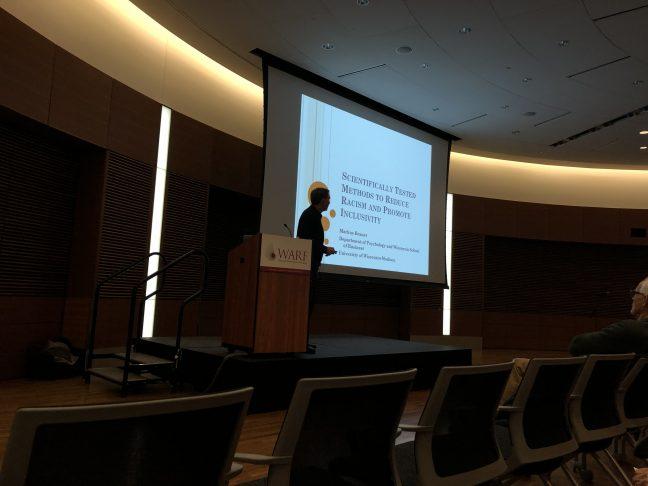In a talk Tuesday night, University of Wisconsin psychology professor Markus Brauer said it is possible to evaluate pro-diversity initiatives — but such evaluations aren’t carried out enough.
While Brauer used examples from workplaces and universities to demonstrate how these evaluations operate, he said his evaluations have implications for other settings as well.
Evaluating these diversity interventions, Brauer said, must be done by looking at the outcomes after such programs are implemented. For example, observing changes in people’s willingness to confront discrimination, or looking at consequential outcomes of marginalized groups such as dropout rates in universities.
“In recent years there has been an increasing number of programs that have evaluated pro-diversity initiatives and it turns out that many of them are ineffective and some of them actually counterproductive,” Brauer said.
Rutgers professor discusses racial tensions, disparities in public health policy
Brauer said changes are not often seen in workplaces after they implement these programs and that numbers of women and minorities in leadership positions go down in the five years following.
Introduction of grievance systems and standardized job tests are also counterproductive measures, Brauer said. One of the reasons existing pro-diversity initiatives appear ineffective, Brauer said, is because we haven’t thought enough about the target audience.
“The target audience should be people in the middle [who don’t actively discriminate or try to stop discrimination] and whose behaviors you can change,” Brauer said.
Brauer presented successful strategies for having a successful diversity intervention program including prejudice habit-breaking workshops, norm-based interventions and motivational interventions.
As Wisconsin diversity increases, education system still faces substantial racial disparity
Prejudice habit-breaking workshops, in place here at UW, attempt to raise concern and increase awareness of unintentional habits as well as provide strategies to break those habits, Brauer said. The effectiveness of this intervention measured a 14 percent increase in women among the total hired faculty after it took place.
“These strategies require persistent effort and you have to monitor your own behavior and you have to go through life very consciously thinking about what you do and what you think,” Brauer said.
Normative interventions focus on changing people’s perceptions of what’s “normative” to influence their behavior through internal communication or workshops, Brauer said.
This internal communication is implemented with videos featuring company executives endorsing diversity as essential to their operations, posters through the company and curriculum vitae testing studies.
CV testing studies send out sets of CVs to the company with comparable quality, the main difference being one name appearing more ethnic than the other.
“[Michelin tires] hired an external company to do this testing [and] then identified the departments where there was hiring biases, communicated about that before reviewing the hiring practices that were employed in each of these departments,” Brauer said. “Then they employed the [external] company to do that again three years later and then communicated internally in the company.”
Another way to change people’s perceptions of norms is to communicate their peers benefitting from diversity, having pro-diversity attitudes and behaving in an inclusive manner, Brauer said.
Motivational interventions use a “cost-benefit analysis” lens to communicate pro-diversity messages and encourage inclusive behavior, Brauer said. These campaigns make salient the benefits of acting in pro-diversity manners, Brauer said, such as getting to know new people and expand your ability to think outside the box.
“We can do it right,” Brauer said. “If we use diversity initiatives that do it right and work with people who actually evaluate in a systematic way, we can achieve very impressive results.”


















